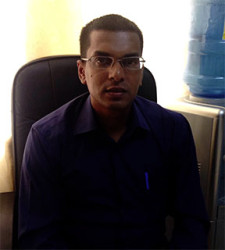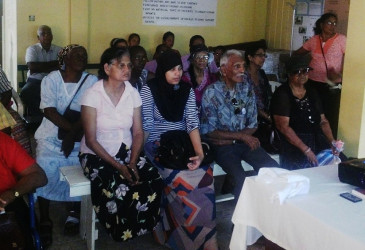Public education remains crucial to tackling and controlling diabetes and needs to be disseminated across the nation.
In Guyana, there are diabetic clinics at various public health institutions administering to the needs of patients. Persons often assemble from as early as 5 am in order to see doctors, test their blood sugar and have medication prescribed. However due to the large numbers attending clinic or language barrier (in cases where the doctor is a foreigner) diabetics can be incorrectly instructed, given basic or little information and left to manage the condition alone.
With an eye to addressing this need, Dr Harrypersaud Chand, who is in charge of the Skeldon Public Hospital, Corentyne, Berbice, has been heading a project for the past three years called the ‘diabetic school,’ which aims to educate health care providers and diabetic patients on how to adapt to a new life style.

At the diabetic school (the only one in the region) persons are educated on the dangers of uncontrollable diabetes, the various local products which can be used as substitutes, instructed in meal preparation focusing on recipes, cooking methods and appropriate portion sizes, as well as the importance of exercise.
Dr Chand further explained that the school which runs once a week for two hours, is structured similar to a support group giving attendees the opportunity to share their knowledge with each other. Caregivers/persons who reside with diabetic patients are also invited to attend the educational sessions.
When the school commenced, Chand said, many of the patients/students were vulnerable seniors in society who required guidance to a healthy lifestyle. Within the first three months, they witnessed results which motivated them to continue.
From the time they attended the classes to their next clinic date, patients were able to report a reduction in their blood sugar levels.

Recently, the school had to be placed into temporary recess due to limited human resources and a lack of funding. Chand stated that funding for a month is approximately $100,000 and indicated that it was included in the hospital’s 2015 budget but he was yet to receive a response.
From its inception, the project was financed by donations from business persons within the community who valued the initiative. However, as he continues to seek funding, Chand is optimistic that with a recent boost to its human resources the school will reopen in the coming months.
The project which has been hailed a success is recommended for implementation in health care institutions across the country in order to assist in the fight against diabetes and the promotion of education to patients. It is also recommend that this vital information be imparted to young people and non-diabetics as well.
World Diabetes Day was recently observed on November 14, and according to the International Diabetes Foundation (IDF) by 2040, over 640 million persons around the world may be living with diabetes.
Currently, of the 415 million adults living with diabetes few of them are properly educated about the illness. Persons afflicted with what is described as “one of the world’s silent killers,” are still unable to access the correct information necessary for them to transition into a diabetic lifestyle.
Persons desirous of assisting those afflicted with the disease can visit any health care centre across the country to volunteer or pursue further knowledge by visiting the IDF website http://www.idf.org/wdd and join in the campaign.




